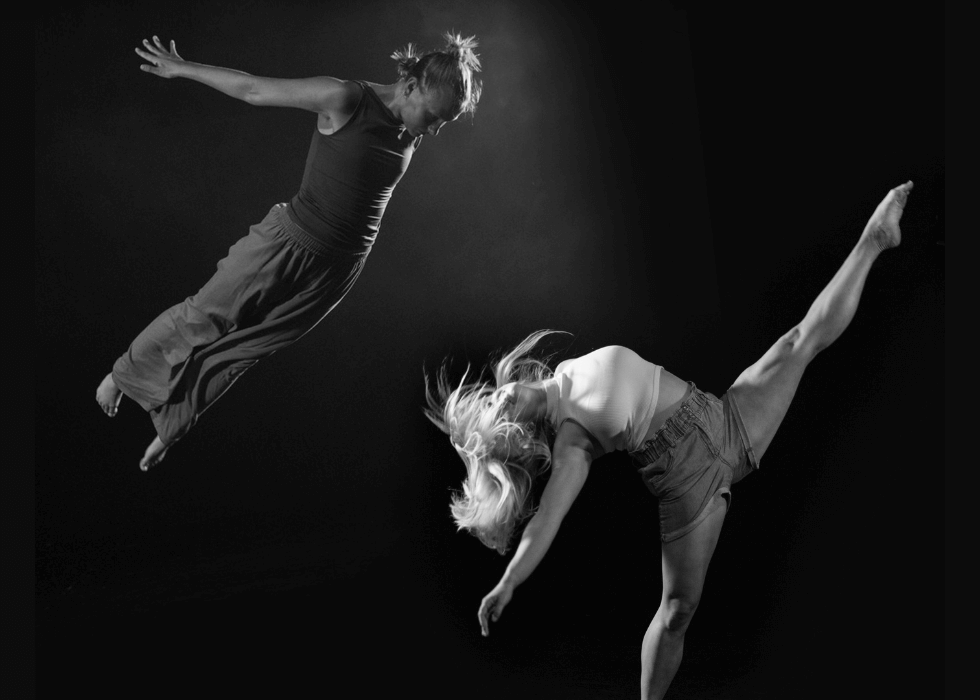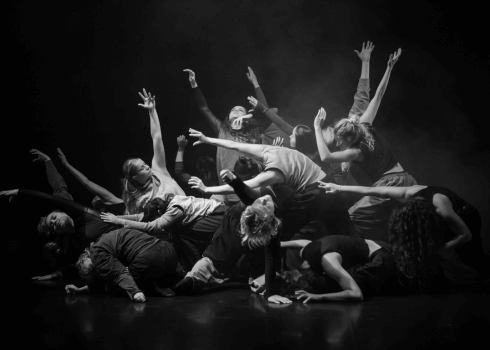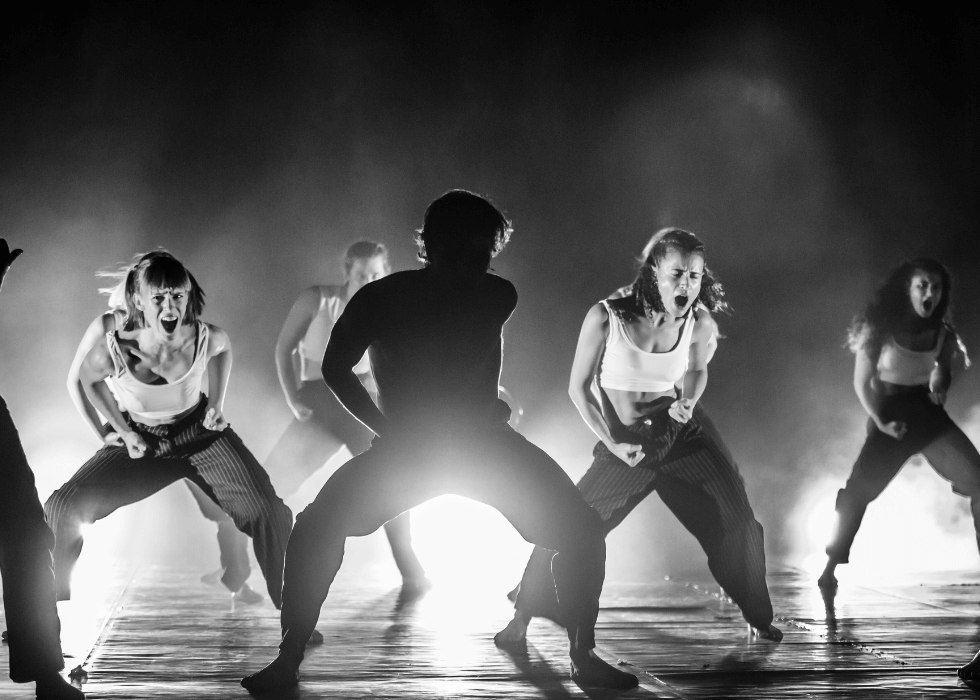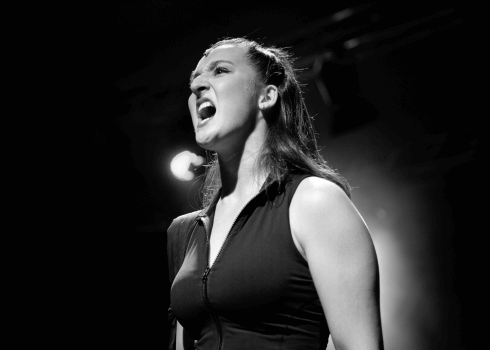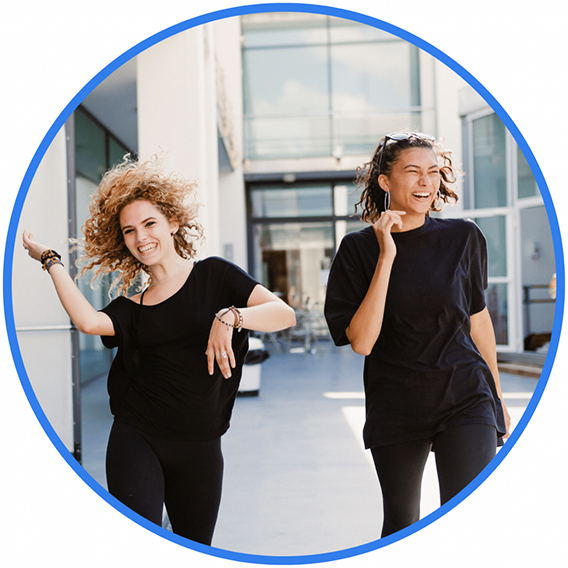Contemporary Actor training for the 21st century
Overview
Programme Name
Bachelor Of Arts with Honours in Acting
Duration
3 academic years (Full time)
Language
English
Programme Leader
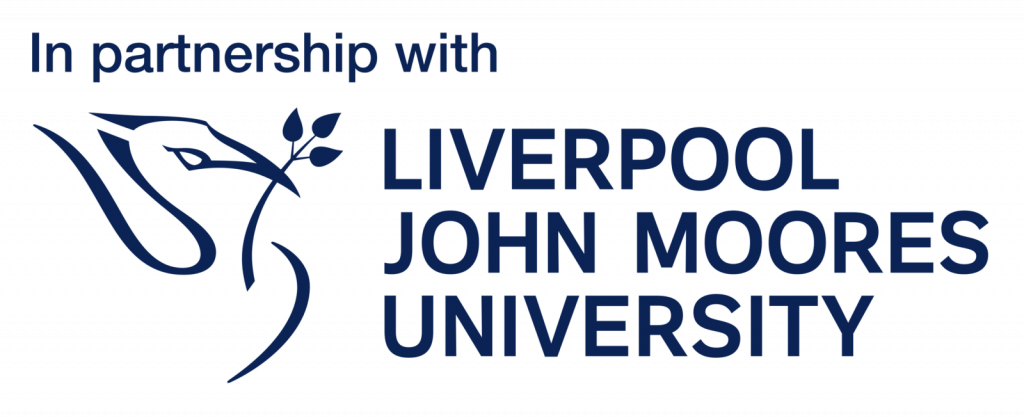
Programme availability
- Applications closed
Start date
Monday 15 September, 2025
BA (Hons) Acting degree is a contemporary professional actor training designed to give you the skills, knowledge, and experience required to pursue a career in theatre, TV, film, radio, and new media.
Our alumni have been featured in Netflix TV shows and films, led international Shakespeare productions, and performed in prestigious repertory theaters.
Note: We are no longer accepting acting applications for entry in September 2025. To join the waiting list to audition, please complete this form.
Find out more about our BA in Acting
The day starts with a student-led warmup from 08:15. Classes typically run from 09:00 to 17:00 and longer when working on projects. Each year is divided into seperate modules covering specific areas of learning. Each module in our bachelor of arts in acting includes assessment points that will help you to measure your own development. As the programme progresses you will be asked to combine your acquired skills and learning, in a series of public performances and assessment tasks.
Within the ba acting course you will gain core foundational skills in acting, voice, movement, and singing, through class workshops, scene studies, small and large group presentations. These skills are developed by exploring challenging classical and contemporary texts, physical theatre, acting for the camera and radio, devising, and interdisciplinary projects. Finally, you will employ your learning in a series of public performances, working with professional production teams and directors. All three years are underpinned by the study of theatre history, criticism, performance theory, and business, delivered through lectures, seminars, class-based exercises, presentations, and research projects. Together with a final year of dedicated professional preparation, we give you all the tools required to prepare you for a career in the performing arts industry.
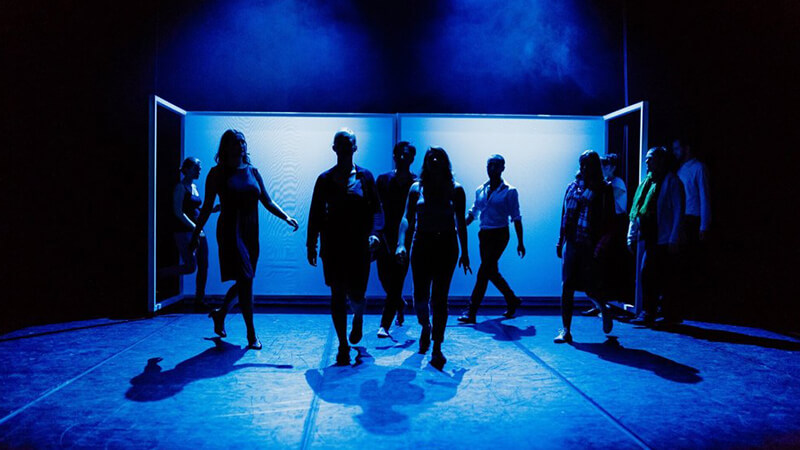
In the first year of our ba in acting course you develop core skills in acting, voice, and movement. You are introduced to theatre history, performance theory and criticism and examine contemporary practitioners. All technique classes are active and practical, requiring group and individual work.
Acting classes will introduce you to the system of Konstantin Stanislavski, alongside the work of his followers, including Michael Chekhov, Uta Hagen and Sanford Meisner. The classes develop from improvisations to scene studies, including 19th and 20th Century Realism, contemporary text, and non-naturalistic forms. You will be introduced to the basic skills of acting for the screen. The year concludes with a studio-based performance of a play.
The voice classes will introduce you to the essential foundations of voice and speech, alongside voice into text, accent work, sight-reading, and singing.
Movement classes are divided into two distinct areas. Actor’s Movement focuses on the study Physical Theatre exploring the work of Laban, Lecoq, Copeau, Decroux, Leabhart and Frantic Assembly, along with animal studies. Dance introduces contemporary dance technique to develop physical freedom and skill. At the end of the second term, Movement and Voice classes collaborate to create an in-house presentation of work ‘in-progress’.
You will be introduced to Healthy Practice for the body, voice, and mind. This will include classes in Alexander Technique and Yoga, vocal health classes, lectures promoting good mental health, and an introduction mindfulness. The aim is to create a set of healthy habits that will sustain you through your training and career.
You will be introduced to exercises to help you develop your own creative practice and to devise your own work. You will be given space to develop an original monologue and perform it in a ‘scratch-night’ scenario. You will be introduced to key skill for the actor including stage combat and intimacy choreography. You will also be introduced to key production and creative roles.
Alongside the practice-based work, the programme includes a core of theoretical studies including introductions to Performance Theory and Criticism, History of Theatre, and a review of contemporary performance and practitioners. You will be given the academic skills require to study on an undergraduate degree and be required to undertake your own research, engage in essay writing, and develop your presentation skills.
At the end of the first year, you will have gained knowledge, experience, and developed a core set of practical and critical skills. You will have engaged and developed them in a variety of challenging class-based projects.
Typical Classes and Projects: Daily Physical and Vocal Warm-up, Improvisation, Text Analysis, Scene Studies, Performance Project, Devising, Voice Foundations, Voice into Text, Speech Sounds, Ensemble Singing, Alexander Technique, Yoga, Actor’s Movement, Dance, Stage Combat, Intimacy Choreography, Academic Skills, Theatre History, Performance Theory. Self-led laboratories and rehearsals.
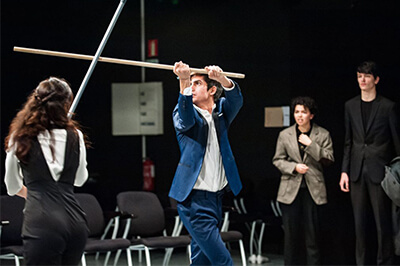
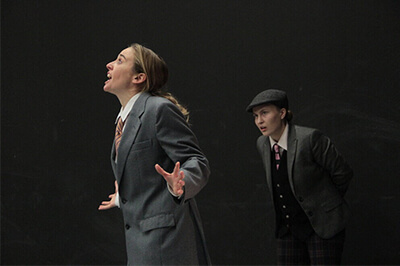
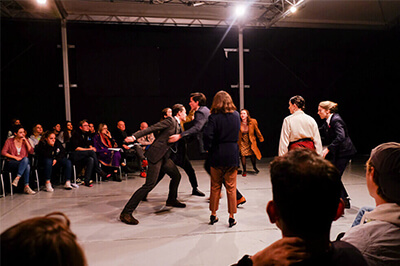
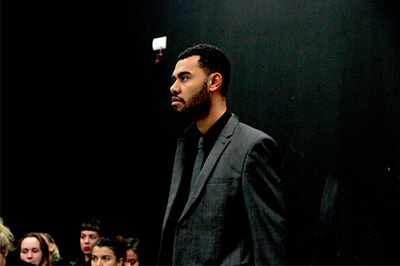

In the second year, you apply and build upon the core skills learnt in year one through a series of classes and practical studio-based projects. You will start to inhabit the creative state in a more consistent way as you continue your transformation from student to professional actor. The BA (Hons) Acting degree second-year ends with your first public production of a play made for young people which will tour local schools.
Acting classes will examine, solidify and extend your technique by exploring different styles and forms. You will work on scenes from a selection of Shakespeare, Comedy of Manners, Musical Theatre, Ensemble work and Comtemporary Writing. You will create new work in the Devising project, both tutor-led and self-led. Your screen acting will focus on scenes shot on location, and you be introduced to microphone technique.
Voice classes will continue voice and text work with explorations of heightened text, work on accents, and developing your singing voice with a more complex range of repertoire. All this will be tested in a range of in-class and public performances.
Movement classes introduce mask work (Jacques Copeau), movement improvisation (Jacques Lecoq) and Commedia dell’arte and further explore physical theatre. This builds towards a joint performance with the BA (Hons) Dance students in an interdisciplinary project. You will also be introduced to a range of social dances, develop contemporary dance technique and continue yoga practice.
History, Theory and Criticism classes develop your understanding of contemporary performance practice, and Arts Industry introduces you to business structures. You will develop your research, analysis, writing, and presentation skills. This perspective will help you to reflect upon your role within the performing arts.
Typical Classes and Projects: Shakespeare, Comedy of Manners, Devising, Self-led laboratories and rehearsals, Acting for Screen and Recorded Media, Public Performance Project, Voice Development, Voice into Text, Accents, Singing, Mask Work, Physical Theatre, Interdisciplinary Movement Project, Contemporary Dance, Social Dance, Business and Professional Studies Contemporary Performance Practice, also including a variety of workshops and visiting lecturers.
In the final year you put skills to the test in a series of public performances in the IAB’s Theatres and in Barcelona. These productions will be directed by IAB staff and international guest directors. You will explore a variety of material and styles as you gain experience in a variety of professional setting. These will include the performance of 1 physical piece, 2 productions of existing plays, and the creation of a new piece of contemporary theatre. You will be expected to work in a professional manner, working long hours and intensively towards the performances. Movement, voice, stage combat and intimacy direction, will support each production, where appropriate. Along with the live performances you will take part in a short film project, where you will be expected to plan and crew the shoot, as well as act in it.
Voice and Singing classes are focused on production support and on the creation of a dedicated Voice Reel, recorded in a professional studio. Movement classes will focus on developing the Physical Piece. Dance and Voice classes will also refocus on healthy practice in the creation of personalised voice and body plans focusing on sustaining healthy practice.
Career Preparation classes focus on how you will interact with the industry when you move into the professional world. You will create promotional material including, headshots, CVs, websites, and take part in workshops on audition technique. You will create a career development plan that explores, in detail, your next professional and academic steps. You will rehearse and perform an industry-focused Showcase at the IAB.
History, Theory and Criticism classes culminate in a Research Project. You will work autonomously with guidance from IAB staff, as you hone your critical skills.
Typical Classes and Projects: Production and Showcase Rehearsals, Short Film Project, Movement and Voice Workshops, Singing, Dance Class, Voice Reels, Career Preparation, Audition Workshops, Research Project.

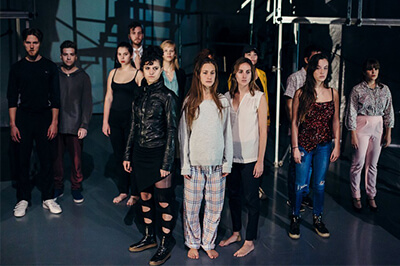
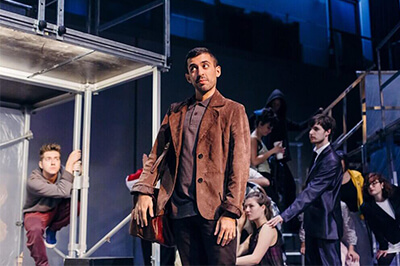
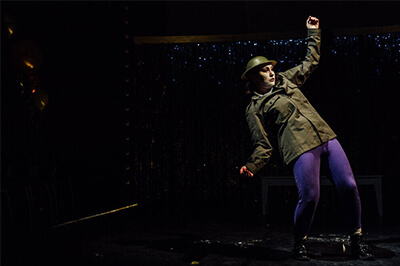
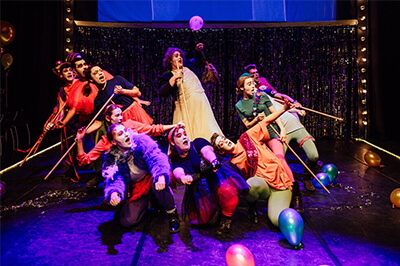
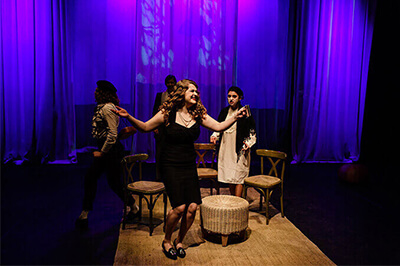
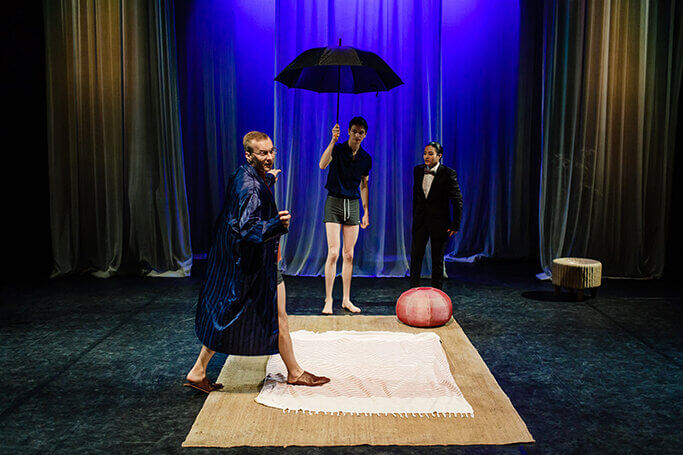
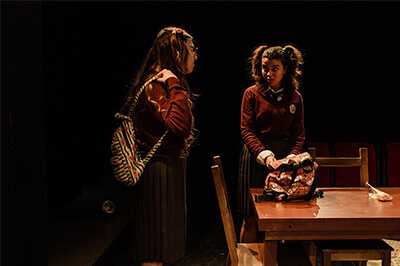
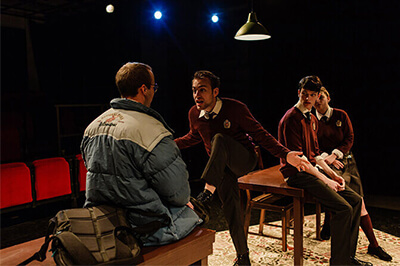
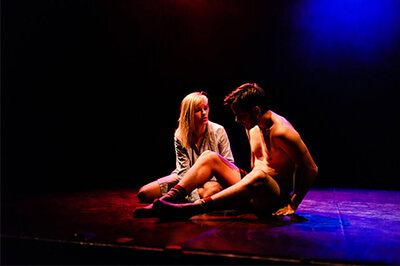
As part of your acting degree training, you will have the chance to work with external directors and creatives that will come to direct plays and take part of seminars and Q&As. Here are some of the guest artists that have contributed to our bachelor of arts in acting over the past years:
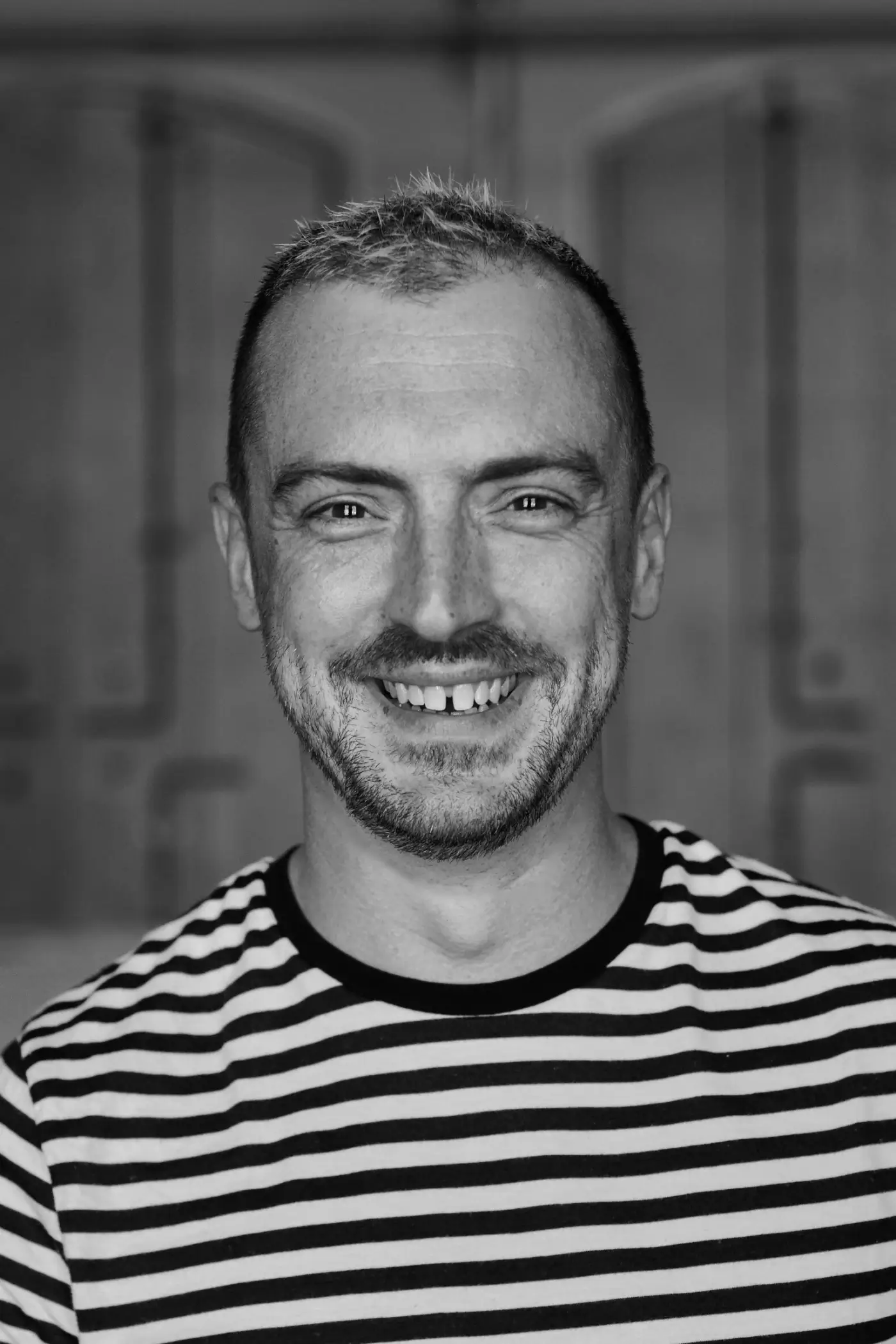

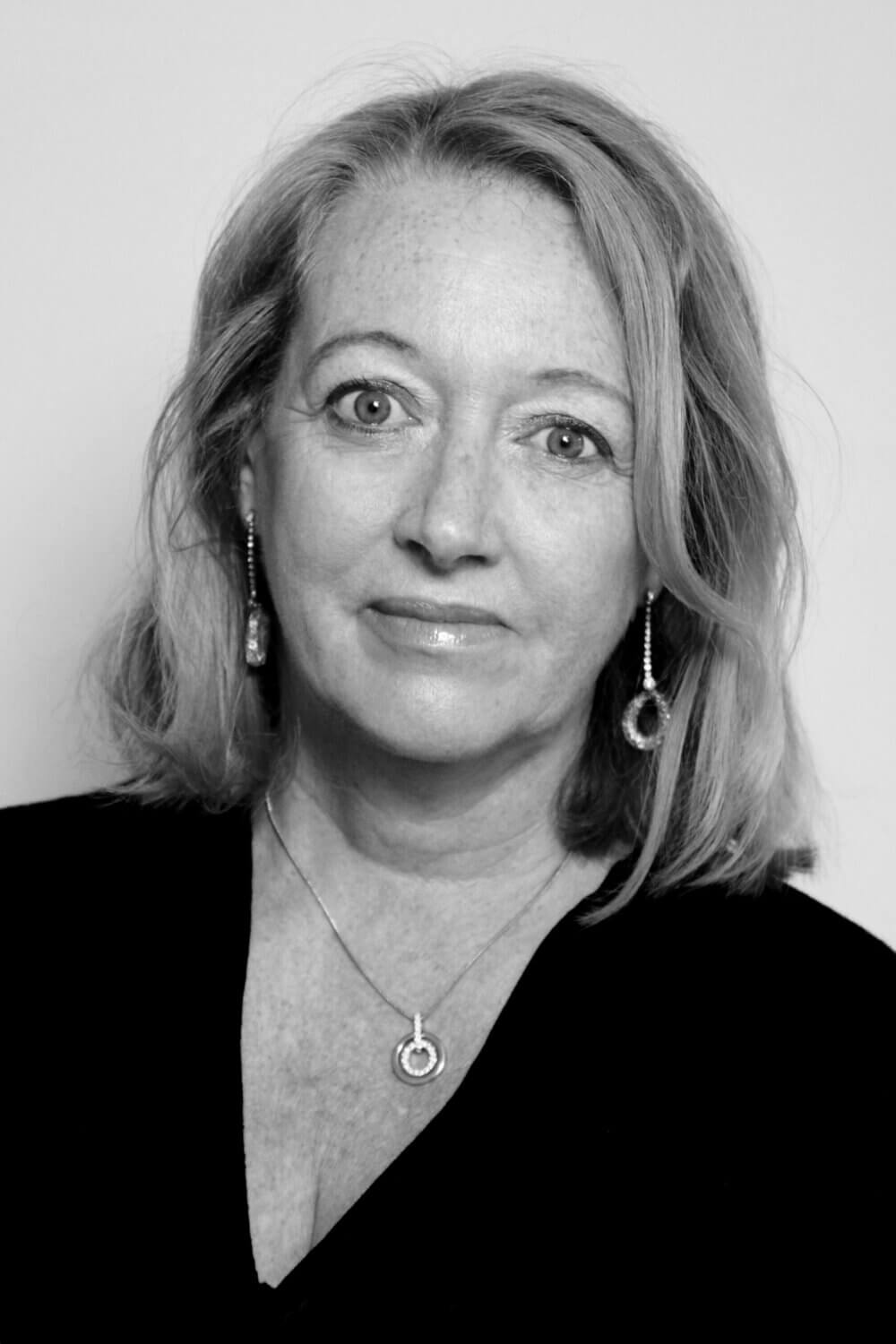
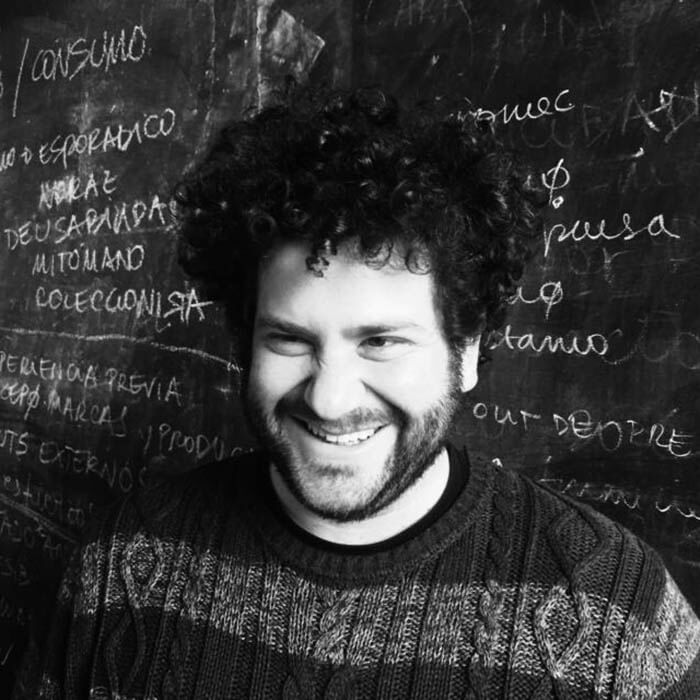

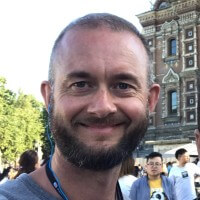
How to apply
- 1. Submit your application
- 2. Attend the audition
- 3. Wait for the result
1. Submit your application
To apply for our BA (Hons) Acting course, you must submit an application and select which audition you would like to attend.
2. Attend the audtition
What does the audition consist of?
Live Audition and Interview
You will have a 30-minute session with our staff where you will be asked to perform:
- Contemporary monologue
- Classical monologue
- Song (Acapella or with music)
The audition will be followed by an interview.
3. Wait for the result
The audition results can take up to 4 weeks to process.
Note: We are no longer accepting acting applications for entry in September 2025. To join the waiting list to audition, please complete this form.
Our tuition fees are made up of a number of different components and are determined by your nationality, country of residence and programme of study.
ANNUAL TUITION FEES
- €11,900
Additional annual fees:
- €500 – Non-refundable registration fee
- €80 – IAB Health Clinic membership
Fees
ANNUAL TUITION FEES
- €16,900
Additional annual fees:
- €500 – Non-refundable registration fee
- €80 – IAB Health Clinic membership
Successful audition, IELTS 6.0 or equivalent, and the national university entry academic qualification of your country equivalent to 104 UK Tariff points or 24 points from an International Baccalaureate. Mature applicants without recognised university entry-level academic qualifications are assessed on their experience to date.
Find out more about our entry requirements.
A graduation will be arranged by the IAB for all graduating students. Further information is provided directly to graduating students.

Degree of Bachelor of Arts in Acting
After successfully completing your BA (Hons) Acting, you will receive a UK university certificate and transcript of studies issued by Liverpool John Moores University.
The certificate wording will state:
Degree of Bachelor of Arts with (classification) having followed an approved programme of study in Acting
Graduates of BA (Hons) Acting degree have all the key skills required to begin their careers as professional actors, or in a variety of roles within the performing arts industry. Your training will allow you to seize opportunities in stage, film, television, radio, musical theatre, physical theatre, community theatre practice, arts education, and new emerging media.
Additionally, the IAB’s international dimension means you are well placed to take advantage of the growing global economy of the performing arts, as it continues to become truly international.
Our graduates are sought after in the industry for their high level of skill in many areas, diversity in cultural background, adaptability, professionalism, and language skills.
Graduates are working on stage and screen in Barcelona, Madrid, London and Berlin. They have created their own companies, written their own work, and have progressed onto Masters programmes. In a short period of time IAB graduates are making their first steps into the preforming arts industry across the globe.
If your ambition is to continue with your studies, this degree is recognised internationally and will allow you to progress to postgraduate/master’s degree studies at IAB or throughout Europe, the USA and beyond.
Ask our students any question you may have about our programmes, life in Sitges or any other question you might have!
submit an application to book your audition!
We are no longer accepting acting applications for entry in September 2025. To join the waiting list to audition, in case last minute places should become available, select “Join the waiting list” in the “Planned Year of Enrolment” field.

